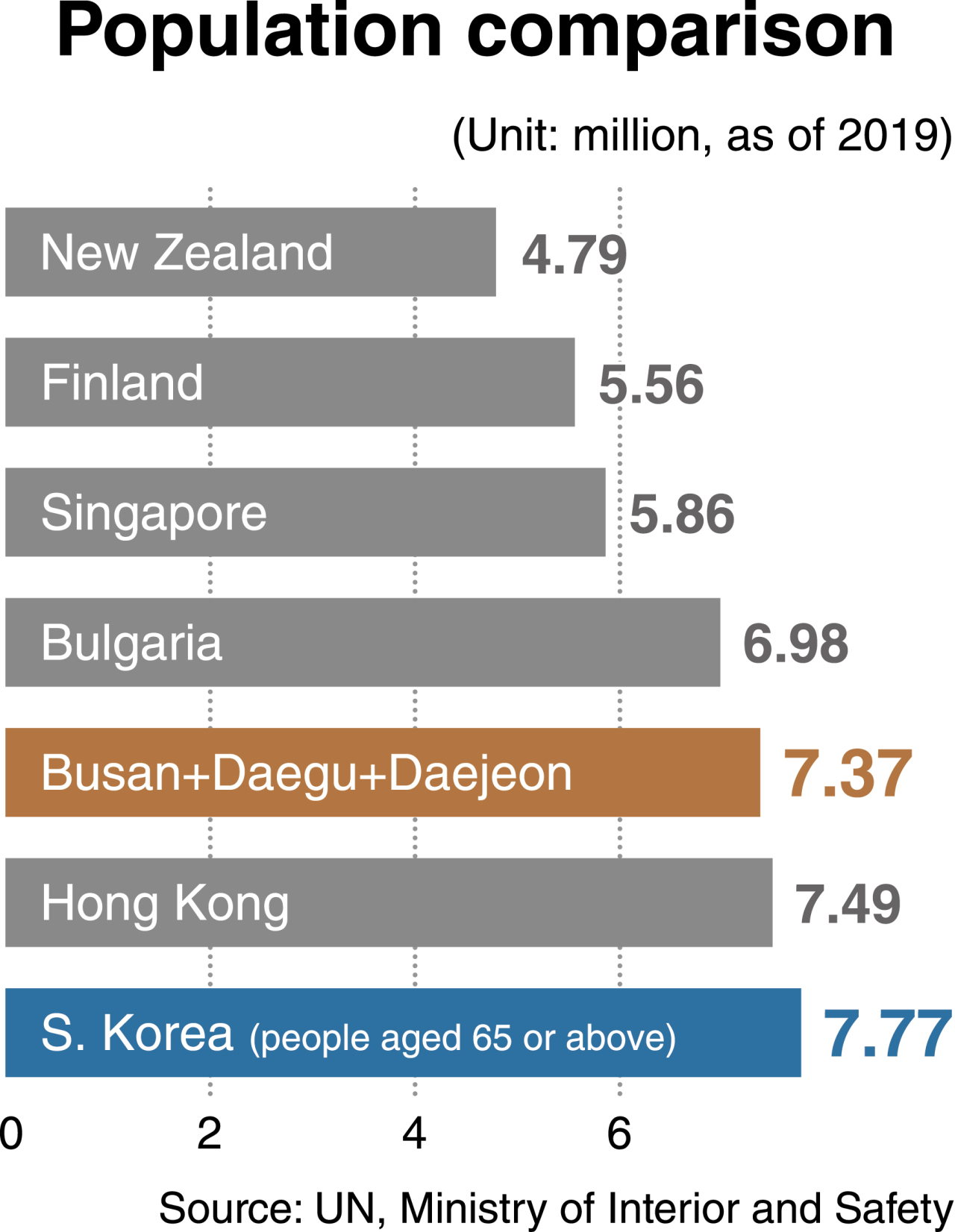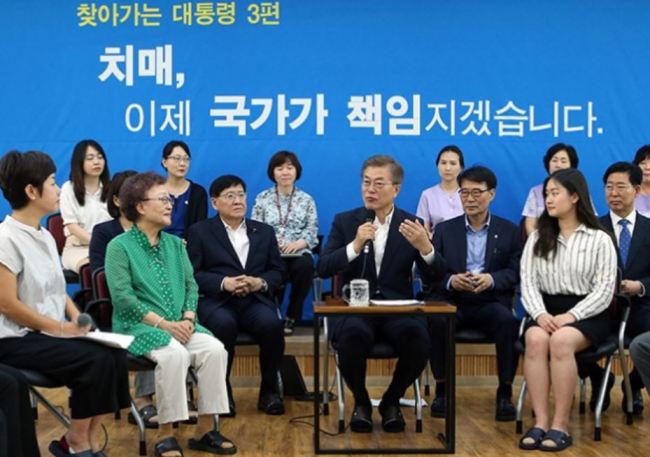[News Focus] Soaring elderly population outnumbers Busan, Daegu, Daejeon combined
By Kim Yon-sePublished : May 14, 2019 - 16:35
SEJONG -- The government has embarked on research into whether it should raise the threshold at which it considers people senior citizens from the current 65 years old to 70.
Though South Korea has followed UN standards stipulating the age of seniors, the recent move to fine-tune it comes amid rapid growth in the percentage of Koreans who are aged 65 or above.
A decade ago, 10.39 percent of Koreans were aged 65 or over -- 5.15 million out of 49.59 million citizens, according to the Ministry of Interior and Safety.
Though South Korea has followed UN standards stipulating the age of seniors, the recent move to fine-tune it comes amid rapid growth in the percentage of Koreans who are aged 65 or above.
A decade ago, 10.39 percent of Koreans were aged 65 or over -- 5.15 million out of 49.59 million citizens, according to the Ministry of Interior and Safety.

The nation saw that number jump to 7.77 million as of April 2019, or 14.99 percent of the 51.83 million in total population. Their portion was 14.41 percent in April 2018 and 13.78 percent in April 2017.
Thie means that the nation’s seniors now outnumber the total population of Busan (3.43 million), Daegu (2.45 million) and Daejeon (1.48 million) as of last month. These are Korea’s second-, fourth- and fifth-largest cities.
The elderly scale also surpasses the population of Hong Kong (7.49 million), Bulgaria (6.98 million), Singapore (5.86 million), Denmark (5.77 million), Slovakia (5.45 million), Ireland (4.84 million) and New Zealand (4.79 million).
Their number is estimated be on the par with the current population level of Switzerland (8.60 million as of 2019) in the early 2020s, and with Sweden (10.05 million), Portugal (10.25 million) and Greece (11.12 million) in the mid 2020s.
According to Statistics Korea’s outlook on the population, the proportion of people aged 65 or over will break the 20 percent mark by 2025 and 30 percent (15.71 million in number) by 2036. This indicates 3 out of every 10 Koreans will be 65 years old or more in about 15 years.
The projection for rapid growth in the senior population is convincing, given that Korea overtook 20 countries including the UK, Germany and the US in life expectancy over the past two decades and the falling percentage of those aged under 15 due to low fertility rates.
The portion of Koreans aged between 0 and 14 stayed at 12.66 percent, or 6.56 million out of the total 51.83 million.
In April 2009, their percentage reached 16.96 percent, or 8.41 million among the total 49.59 million, which is by more than 4 percentage points higher than the current level.
Early this year, Health and Welfare Minister Park Neung-hoo said the nation should start hearing public opinion on raising the age of seniority by 5 years on a gradual basis, and argued that the percentage of the population who were economically active would climb via the revision.
Public opinion appears to be spilt in the online community.
Some welcomed the policymakers’ move to raise the low-ceiling, pointing out that those in their middle and late 60s are quite young, compared to decades ago.
But some online commenters raised speculations that the move might be low-key aimed at reducing the government expenditure on social welfare by simultaneously raising the minimum age of people for the first year to take their National Pension.
“I believe the move could also be backed by the private sector as well as the (state-run) National Pension Service,” a commenter said. “Insurance companies are likely to enjoy delaying the first payment years for policyholders.”

Currently, people born in 1969 and later, could receive monthly annuity from the National Pension for the first time when they become 65 years after paying premiums for at least 10 years. They could also apply for early receipt in which advance the first eligible age to 60 if they have no income sources.
A private research fellow in Sejong Autonomous City said “it seems that the government is taking countermeasures against feasible depletion of the state pension balance (in the coming decades). However, job security should precede the plan.”
A large portion of enterprises have introduced early redundancy programs to cut payrolls, he said. and wage peak systems that pay employees less when they reach their mid or late 50s.
“The backlash would be tough should the statutory age for the first annuity receipt is revised up,” he said.
Meanwhile, the number of South Koreans aged 70 or above came to 5.33 million, accounting for 10.28 percent of the total in April 2019.
Their proportion was 8.47 percent (4.33 million out of 51.20 million) five years ago, and 6.52 percent (3.23 million out of 49.59 million) 10 years ago, data from the Interior Ministry showed.
By Kim Yon-se (kys@heraldcorp.com)











![[From the Scene] Monks, Buddhists hail return of remains of Buddhas](http://res.heraldm.com/phpwas/restmb_idxmake.php?idx=644&simg=/content/image/2024/04/19/20240419050617_0.jpg&u=20240419175937)



![[From the Scene] Monks, Buddhists hail return of remains of Buddhas](http://res.heraldm.com/phpwas/restmb_idxmake.php?idx=652&simg=/content/image/2024/04/19/20240419050617_0.jpg&u=20240419175937)

![[KH Explains] Hyundai's full hybrid edge to pay off amid slow transition to pure EVs](http://res.heraldm.com/phpwas/restmb_idxmake.php?idx=652&simg=/content/image/2024/04/18/20240418050645_0.jpg&u=20240419100350)

![[Today’s K-pop] Illit drops debut single remix](http://res.heraldm.com/phpwas/restmb_idxmake.php?idx=642&simg=/content/image/2024/04/19/20240419050612_0.jpg&u=)